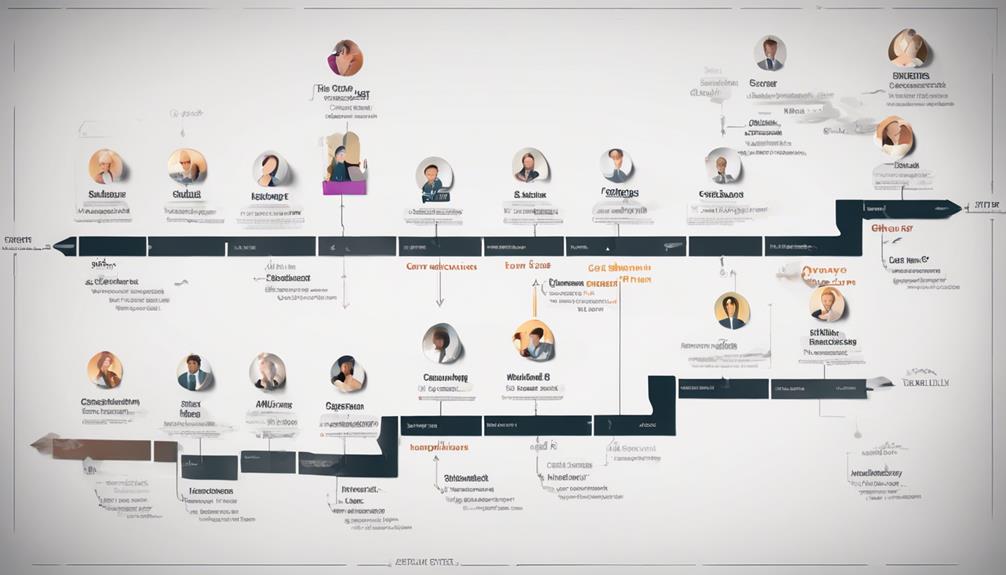Did you know that the divorce rate in Michigan is around 10.1 per 1,000 people in the total population?
Understanding the intricacies of the divorce process can be complex, but with our comprehensive guide on ’10 Steps to Get a Divorce in Michigan,’ we break down each crucial stage to help you navigate through this challenging time.
From residency requirements to finalizing the divorce, this guide offers a roadmap to assist you in understanding the legal procedures and requirements involved in obtaining a divorce in Michigan.
Key Takeaways
- Meet Michigan residency requirements for jurisdiction.
- File a Complaint for Divorce without fault allegations.
- Respond and counterclaim within 21 days.
- Finalize with a mutually agreed Settlement Agreement.
Residency Requirements
Navigating the divorce process in Michigan begins with understanding the residency requirements one must fulfill. To file for divorce, at least one party must be a state resident for a minimum of 180 days. Additionally, Michigan law mandates that one spouse needs to be a county resident for 10 days before initiating the divorce proceedings. These requirements ensure a connection between the divorcing couple and the state and county where the legal process will take place.
Being a state resident for the specified time frame establishes a commitment to the Michigan jurisdiction, while the county residency requirement allows for a more localized attachment to the legal proceedings. Exceptions to these rules exist for cases that involve a minor child at risk of international abduction, emphasizing the importance of safeguarding vulnerable family members in divorce situations.
Fulfilling the state and county residency requirements is crucial for filing for divorce in Michigan, as it determines the appropriate jurisdiction for the legal process to unfold smoothly and effectively. Proper documentation and adherence to these residency rules are essential to ensure the divorce proceedings proceed without unnecessary complications.
Grounds for Divorce

In Michigan, a divorce can be a challenging and emotional process. Our state operates under no-fault divorce laws, where a breakdown in the marriage is sufficient grounds for divorce. Fault allegations aren’t required, but it’s helpful to be aware of the different grounds available for those seeking to end their marriage in Michigan.
Valid Grounds Defined
When seeking a divorce in Michigan, understanding that the state operates under no-fault laws is crucial. This means that fault allegations aren’t necessary to dissolve a marriage. In Michigan, the valid grounds for divorce revolve around the concept of an irretrievable breakdown of the marriage relationship.
Specific fault allegations aren’t required, as a simple statement declaring the irreparable breakdown of the marriage is sufficient to meet the grounds for divorce. This no-fault approach allows individuals to end their marriage without needing the consent of the other spouse or proving any wrongdoing.
No-Fault Divorce Option
Couples in Michigan can choose to pursue a divorce based on the grounds of the irretrievable breakdown of their marriage, without the need to assign specific fault allegations. In a no-fault divorce, the focus is on the deterioration of the marital relationship rather than blaming one party. This option streamlines the process, eliminating the requirement for extensive evidence of fault. Here is a breakdown of the no-fault divorce option in Michigan:
| No-Fault Divorce Option |
|---|
| Michigan is a no-fault divorce state |
| Couples can cite the irretrievable breakdown of the marriage |
| No specific fault allegations are needed |
| Focus is on the breakdown of the marital relationship |
| Simplifies the divorce process and reduces the need for proving fault |
This approach allows couples to proceed with a divorce solely based on the irretrievable breakdown of their marriage.
Fault-Based Reasons Overview
Moving from the realm of no-fault divorce in Michigan, where couples focus on the breakdown of their marital relationship, we now shift our attention to exploring the overview of fault-based reasons for divorce, also known as grounds for divorce. In Michigan, fault-based reasons aren’t a requirement for divorce, as the state primarily focuses on the irretrievable breakdown of the marriage relationship.
The Complaint for Divorce in Michigan doesn’t necessitate specific fault allegations. Here are some key points to consider regarding fault-based reasons for divorce in Michigan:
- Fault-based reasons aren’t mandatory for filing for divorce.
- The emphasis in Michigan is on the irretrievable breakdown of the marriage.
- Specific fault allegations aren’t needed in the Complaint for Divorce.
- Consent from the other spouse isn’t required for a no-fault divorce.
- Courts in Michigan require a statement declaring the irreparable breakdown of the marriage for divorce proceedings.
Filing the Initial Petition

To initiate the divorce process in Michigan, the essential first step involves filing a Complaint for Divorce with the court. The Complaint for Divorce serves as the initial legal document that outlines the basic facts of the marriage and the reasons for seeking a divorce. It is crucial to accurately identify the Plaintiff (the filing spouse) and the Defendant (the other spouse) in the legal paperwork. In cases involving minor children, a Verified Statement must be signed to provide essential information regarding custody, support, and parenting time. Once the Complaint is filed, Ex Parte Orders may be entered by the court to address temporary issues such as child custody or support until a final agreement is reached.
| Key Points | Details |
|---|---|
| Document to File | Complaint for Divorce |
| Required in Some Cases | Verified Statement for cases involving minor children |
| Temporary Orders | Ex Parte Orders for addressing immediate issues like child custody/support |
Serving the Spouse

After filing the Complaint for Divorce in Michigan, the next crucial step in the process is ensuring proper service of the divorce papers to the spouse within 90 days. Serving the spouse is a critical aspect of the divorce proceedings, as it initiates their involvement in the legal process. Here are some key points to consider when serving the spouse:
- Service of divorce papers must occur within 90 days to comply with Michigan laws.
- The spouse can be served personally by a process server or through certified mail for convenience.
- Proof of Service must be filed with the court to confirm the spouse’s receipt of the divorce papers.
- Proper service ensures that the spouse is informed about the divorce proceedings and can respond accordingly.
- Failure to serve the spouse correctly can result in delays in the divorce process, prolonging the resolution of important matters. Proper service is essential to moving the divorce process forward efficiently.
Response and Counterclaim

Upon being served with the Complaint for Divorce in Michigan, the Defendant must file a Response within 21 days to address the issues outlined, such as property division, spousal support, and child custody. This Response is a crucial step in the legal process, as it allows the Defendant to present their side of the story and contest any claims made by the Plaintiff. Additionally, within the Response, the Defendant has the option to include a Counterclaim. A Counterclaim enables the Defendant to not only respond to the allegations made in the Complaint but also to assert their own claims and requests for relief. This can significantly impact the direction of the case and the eventual settlement. Failure to file a Response within the specified time frame may result in a default judgment being issued in favor of the Plaintiff, potentially leading to unfavorable outcomes for the Defendant. It is essential for the Defendant to carefully consider their Response and, if applicable, Counterclaim to protect their rights and interests throughout the divorce proceedings.
| Response and Counterclaim | |
|---|---|
| Purpose | Address issues raised in the Complaint and assert additional claims. |
| Timeline | Must be filed within 21 days of being served with the Complaint. |
| Impact | Shapes the direction of the case and influences the final settlement. |
| Consequences | Failure to respond may lead to a default judgment in favor of the Plaintiff. |
Discovery Process

During the discovery process in a Michigan divorce, both parties engage in exchanging financial information and relevant documents to gather evidence and information supporting their respective cases. This stage is crucial for a thorough examination of the marital estate, ensuring transparency and fairness in assessing assets, debts, income, and other relevant factors. The discovery methods employed can include interrogatories, requests for the production of documents, and depositions.
- Interrogatories: Written questions that must be answered under oath.
- Requests for Production of Documents: Formal requests to provide specific documents related to finances and assets.
- Depositions: Oral testimonies given under oath, allowing for detailed questioning.
Engaging in the discovery process is essential for both parties to understand the full financial picture of the marriage, aiding in informed decision-making and negotiation strategies. It sets the groundwork for the subsequent stages of the divorce process, impacting the eventual settlement or trial outcomes significantly.
Negotiating Settlement

In negotiating a settlement for a Michigan divorce, active participation from both spouses is essential to address key issues such as property division, child custody, and spousal support.
When discussing child custody, it’s vital to prioritize the best interests of the child and create a parenting plan that outlines custody arrangements and visitation schedules.
Spousal support negotiations require considering factors like the length of the marriage, each spouse’s financial situation, and contributions to the marriage.
Effective negotiation involves open communication, willingness to compromise, and understanding each other’s concerns.
Seeking legal advice or mediation services can provide valuable support during the negotiation process, helping navigate complex legal requirements and ensuring that both parties’ rights are protected.
Mediators can facilitate discussions and assist in finding common ground to reach a mutually acceptable settlement.
Once an agreement is reached, documenting it in writing and submitting it to the court for approval is crucial to finalize the divorce process smoothly and efficiently.
Court Hearings

When negotiating a settlement for a Michigan divorce, active participation from both spouses is crucial to address key issues such as property division, child custody, and spousal support. Court hearings in Michigan for divorce typically involve a judge reviewing the divorce terms and ensuring legal compliance. These hearings serve as a pivotal step in finalizing the divorce process and issuing a Judgment of Divorce.
Here are some key points to remember about court hearings in Michigan:
- The judge may ask questions during the hearing to clarify any aspects of the divorce agreement.
- Attendance at the final hearing is mandatory for both parties to complete the divorce proceedings.
- Court hearings provide an opportunity for the judge to address any outstanding issues before granting the divorce.
- The judge will carefully review the terms of the divorce to ensure they comply with Michigan divorce laws.
- It’s essential to come prepared and respectful to court hearings to facilitate a smooth and efficient process towards obtaining a Judgment of Divorce.
Finalizing the Divorce

When finalizing a divorce in Michigan, it’s essential to navigate the Settlement Agreement process and prepare for the Court Hearing where the terms of the divorce will be discussed.
The Decree, issued by the court, marks the official end of the marriage, outlining the rights and responsibilities of each party.
Ensuring all legal requirements are met during this phase is crucial for a smooth and official conclusion to the divorce process.
Settlement Agreement Process
Upon reaching an agreement on terms such as property division, child custody, and support, both spouses must mutually finalize the divorce process in Michigan by signing a legally binding settlement agreement. This settlement agreement plays a crucial role in ensuring a smooth transition from married to single life. Here are five key points to consider during the settlement agreement process:
- The settlement agreement in Michigan outlines terms for property division, child custody, and support.
- It must be mutually agreed upon by both spouses to finalize the divorce process.
- The agreement is a legally binding document that requires both parties’ signatures.
- Once approved by the court, the settlement agreement becomes part of the final divorce judgment.
- Failing to adhere to the terms of the settlement agreement can result in legal consequences.
Court Hearing and Decree
Typically, we attend a court hearing to finalize the divorce in Michigan, where the judge reviews the terms agreed upon by both parties. During this process, both parties will testify regarding the agreed provisions of the divorce.
In cases without minor children, there’s a mandatory 60-day waiting period before the Judgment of Divorce is issued. However, if minor children are involved, the waiting period extends to 180 days before the divorce is finalized. It’s crucial to adhere to these waiting periods as they’re designed to ensure that all aspects of the divorce are properly considered, especially concerning any minor children involved.
Additionally, addressing retirement benefits through a Qualified Domestic Relations Order (QDRO) or an Eligible Domestic Relations Order (EDRO) may be necessary during the finalization process.
Post-Divorce Considerations

After finalizing your divorce, it’s crucial to take proactive steps to address various post-divorce considerations for a smooth transition into this new chapter of your life.
Review and update estate planning documents post-divorce to ensure they align with your current wishes and situation.
Consider revising insurance policies to remove the ex-spouse as a beneficiary or adjust coverage accordingly.
Evaluate and adjust financial accounts, including bank, retirement, and investment accounts, to reflect your new financial goals and circumstances.
Updating personal information like your driver’s license, passport, and social security records is essential for legal and identification purposes.
Additionally, seeking emotional support or counseling can help you navigate the post-divorce period effectively by providing a safe space to process your feelings and emotions.
Frequently Asked Questions
Do I Need a Lawyer for Divorce in Michigan?
We may not need a lawyer for divorce in Michigan, but legal expertise can safeguard our rights and address complexities. The decision hinges on case complexity and comfort with legal procedures. Lawyers provide crucial guidance on state laws and court processes.
How Fast Can You Get a Divorce in Michigan?
We understand the desire for a quick divorce in Michigan. Typically, an uncontested case takes a minimum of 60 days. However, contested divorces can extend for months or even years. The waiting period begins upon filing.
How Much Does It Cost to File for Divorce in Michigan Without a Lawyer?
Filing for divorce in Michigan without a lawyer typically costs around $175 in court fees. Additional expenses, like serving papers on the spouse, can range from $40 to $100. Opting for a DIY divorce can be cost-effective but requires understanding the process.
How Long Does an Uncontested Divorce Take in Michigan?
Getting an uncontested divorce in Michigan is like sailing smoothly through calm waters; it usually takes 60 to 90 days. We know the waiting period varies based on children involved, but efficient paperwork completion can speed up the process.
Conclusion
In conclusion, as they say, ‘Divorce is like a surgery: sometimes it’s necessary to heal.’
Through the 10 steps outlined in this comprehensive guide, navigating the divorce process in Michigan can be a challenging but ultimately liberating experience.
Remember to seek support, stay informed, and prioritize self-care as you embark on this journey towards a new chapter in your life.
You aren’t alone, and there’s light at the end of the tunnel.











